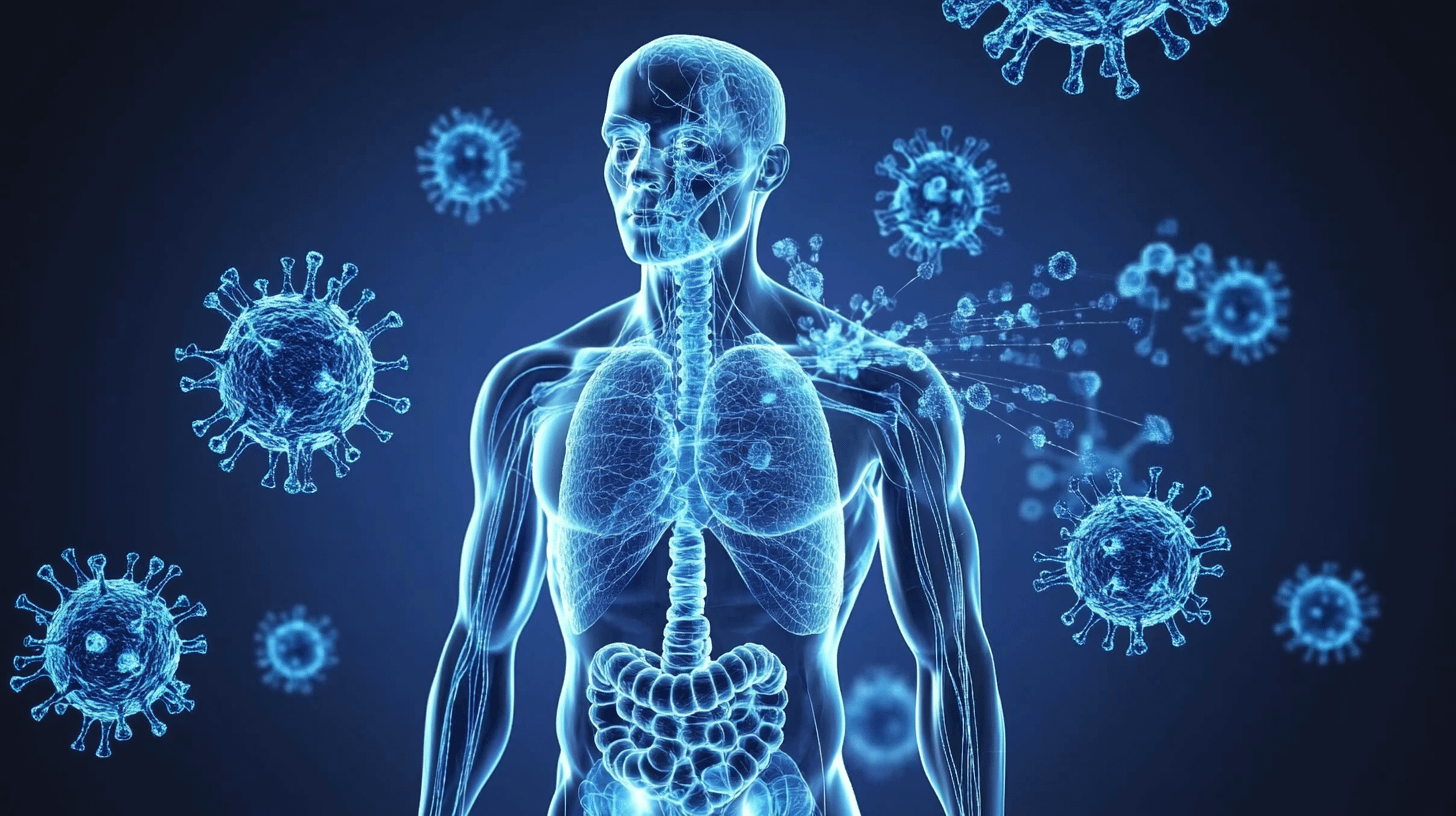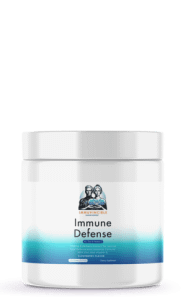Office workers face unique challenges when it comes to maintaining adequate levels of vitamin D. With long hours indoors,...

Your Body’s Bodyguard: Unveiling the Secrets of the Immune System
The immune system is a network of cells, tissues, organs, and molecules that work together to defend the body against harmful invaders such as bacteria, viruses, fungi, and parasites. It is a crucial component of overall health and well-being. The immune system is essential for survival as it protects the body from harmful invaders, maintains homeostasis, and supports overall health. Proper immune function prevents infections and diseases and ensures the body can heal and recover from injuries. Understanding and maintaining a healthy immune system is vital for long-term health and well-being.
Here’s an overview of the immune system and its importance:
Components of the Immune System
- White Blood Cells (Leukocytes):
a. Phagocytes: These are basically your body’s trash cleaners and warriors! They’re a type of white blood cell that patrols your insides looking for trouble. Here’s what they do:
- Eat invaders: If they find germs like bacteria, they engulf them whole, kind of like Pac-Man eating dots. This traps and destroys the bad guys.
- Clean up the mess: They also gobble up dead or dying cells from your body, keeping things tidy and preventing them from causing problems.
Imagine them as tiny janitors with super strength who can also fight off enemies by swallowing them! Phagocytes are a crucial part of your immune system, constantly working to keep you healthy.
b. Lymphocytes: These are another kind of white blood cell, but they work in a different way than phagocytes. Think of them as the special forces of your immune system. Here’s what they bring to the fight:
- Smarter targeting: Unlike phagocytes, which go after anything that seems out of place, lymphocytes can recognize specific threats like viruses or bacteria.
- Two main types: There are two main teams of lymphocytes:
- B cells: These guys make antibodies, which are like special weapons that can target and latch onto specific invaders, making them easier for other immune cells to destroy.
- T cells: These act more like commanders, coordinating the immune response and directly attacking infected cells or abnormal cells in your body.
So, while phagocytes are the fighters on the front lines, lymphocytes are the strategists and specialists who help the body target and eliminate specific threats.
- Organs and Tissues:
-
- Bone Marrow: This is like the giant kitchen where all the body’s helpers, including the immune system’s fighters (immune cells), are made.
- Thymus: Think of this as a training camp. Here, some immune fighters (T cells) learn to recognize and fight off bad guys.
- Spleen: This acts like a super filter for your blood. It helps spot any troublemakers (germs) that might have slipped past the guards.
- Lymph Nodes: Imagine these as watchtowers scattered throughout your body. They have even more immune fighters waiting and watching for any signs of danger from germs. If they find something suspicious, they call for backup to fight it off.
- Molecules, the body’s super tools:
- Antibodies: Imagine these as sticky tags made by clever immune fighters (B cells). These tags can stick to specific parts of the bad guys (germs) like a lock and key, making it easier for other fighters to find and destroy them.
- Cytokines: These are like tiny messengers that zoom around the body. They carry messages between different immune cells, helping them coordinate their attack and work together effectively.
- Complement System: Think of this as a group of superhero helpers! These special proteins join the fight when an enemy (germ) is tagged by an antibody. They help weaken and destroy the germ, making it easier for the immune system to win the battle.
Functions of the Immune System
- Spot the Sneaky Visitors: The guards first need to know who’s bad and who’s good. They check everyone entering the castle (your body) to see if they’re troublemakers (germs) or friendly visitors.
- Fight Off the Bad Guys: If the guards find a germ, they call on the knights (special cells) to attack! They can do this in a few ways, like grabbing the germ and swallowing it whole or shooting special weapons (antibodies) to make it easier to defeat.
- Remember the Battle Plan: The clever guards remember the bad guys they’ve fought before. So, if a familiar germ tries to enter again, they can sound the alarm faster and call for help quicker, making it easier to win the fight next time!
Why the Immune System is Super Important:
The immune system is like your body’s superhero team, working hard to keep you healthy in all sorts of ways:
- Germ Busters: This team’s main job is to fight off bad guys like bacteria, viruses, and other icky stuff that can make you sick. They’re like bodyguards, protecting you from getting infections.
- Disease Defenders: The immune system is like a shield that stops you from getting many diseases. It recognizes and gets rid of anything harmful before it can cause trouble.
- Healing Helpers: If you get a scrape or a cut, the immune system sends special helpers to fix things up! They help heal wounds and get your body back to feeling great.
- Cancer Catchers: The immune system is like a super detective, always on the lookout for anything weird happening in your body. It can even find and destroy bad cells that could turn into cancer!
- Calming Down After a Fight: Sometimes when you get hurt or fight off a germ, your body gets a little inflamed (swollen and red). The immune system helps make sure this inflammation doesn’t last too long and goes away when it’s done fighting.
When the Body’s Superhero Team Gets Confused:
The immune system is usually amazing, but sometimes things can go wrong. Here are a few examples:
- Mixed-up Fighters: Sometimes the immune system gets confused and forgets who the good guys are. This can be like your body’s fighters accidentally attacking your own team instead of the bad guys (germs). This can happen in diseases like rheumatoid arthritis or lupus.
- Overprotective Fighters: Other times, the immune system can be a little overprotective and act like there’s danger when there really isn’t. This is like being super jumpy and scared of everything, even things that can’t hurt you. This can lead to allergies, where your body reacts strongly to things like pollen or dust, even though they’re harmless.
- Weak Fighters: Sometimes the immune system can be weak, like a superhero team that’s missing some members. This can make it harder to fight off germs, making you more likely to get sick. This can happen in some diseases like HIV/AIDS.
The immune system is essential for survival. It protects the body from harmful invaders, maintains homeostasis, and supports overall health. Proper immune function prevents infections and diseases and ensures the body can heal and recover from injuries. Understanding and maintaining a healthy immune system is vital for long-term health and well-being.
If you ever feel worried about something related to your immune system, it’s always a good idea to talk to your health practitioner. They can help you understand what’s going on and keep you healthy.
News
Related Posts
5 Powerful Reasons Kimchi Is a Superfood for Your Immune System
When it comes to boosting your immune system naturally, few foods pack as much power as kimchi. This traditional Korean dish,...
How Proper Sleep Boosts Your Immune System: Tips for Better Immunity
Getting a good night’s sleep isn’t just important for feeling refreshed—it’s also crucial for your immune system. Quality sleep...
Eat Smart, Stay Healthy: Immune-Boosting Nutrition Tips
Maintaining a strong and resilient immune system becomes increasingly important as we age. For adults over 30, it's not just...








